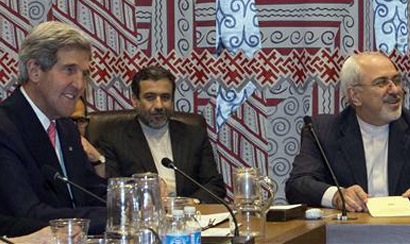The official who asked that his name not be revealed, said that Kerry and Mohammad Javad Zarif met for over an hour at the Waldorf Astoria Hotel in New York City.
The State Department official also noted that "separate and apart from the nuclear issue, they also discussed the threat posed by ISIL. Going forward, Kerry and Zarif agreed to meet further as needed while in New York this week."
The Islamic State, also known as ISIL, which has seized a vast swath of land strew across Iraq and Syria, is recognized as a threat to both Iran and the United States.
Iran`s Supreme Leader said earlier that Iran would not join the military coalition headed by the U.S. to fight ISIL. Reuters reported citing Iranian officials on Sep.21 that Iran is ready to work with the United States and its allies to stop Islamic State militants, but would like more flexibility on Iran`s uranium enrichment program in exchange.
The U.S. official said that "Kerry and Zarif met one-on-one first, and then were joined by Deputy Secretary William Burns and Under Secretary Wendy Sherman on the U.S. side and Deputy Foreign Minister Abbas Araghchi and Deputy Foreign Minister Majid Takht- Ravanchi on the Iranian side.
According to the American official the two sides spent time reviewing the status of the EU-led P5+1 negotiations on Iran`s nuclear program.
"They discussed both the progress that has been made and the work that still needs to be done. Secretary Kerry noted that this week is an opportunity to make additional progress and stressed that it is our intention to do so."
The West wants Iran to have single-digit thousands of active centrifuges, meaning it would take Tehran a long time to use them for producing high-level enriched uranium for nuclear weapon. Tehran who maintains 19,000 centrifuges has rejected reducing the number of active enrichment machines.
Iran and the 5+1 group, including the U.S., the UK, France, Russia, China and Germany, scheduled to resume the nuclear talks, on the sidelines of the UN General Assembly in New York this month.
The first meeting was held between Iran`s Foreign Minister Mohammad Javad Zarif and EU Foreign Policy Chief Catherine Ashton in New York.
Iranian President Hassan Rouhani also will take part in UN General Assembly meeting, but reportedly no meeting between him and U.S. President Barack Obama has been scheduled as of yet.
Iran and the P5+1 group sealed an interim deal for a six-month period in Geneva on November 23, 2013.
Under the deal, dubbed the Geneva Joint Plan of Action, the six countries undertook to provide Iran with some sanctions relief in exchange for Iran agreeing to limit certain aspects of its nuclear activities.
The deal took effect on Jan. 20 and was extended on July 20 until Nov. 24 to reach a permanent deal on Iran`s disputed nuclear program.
More about:
















































